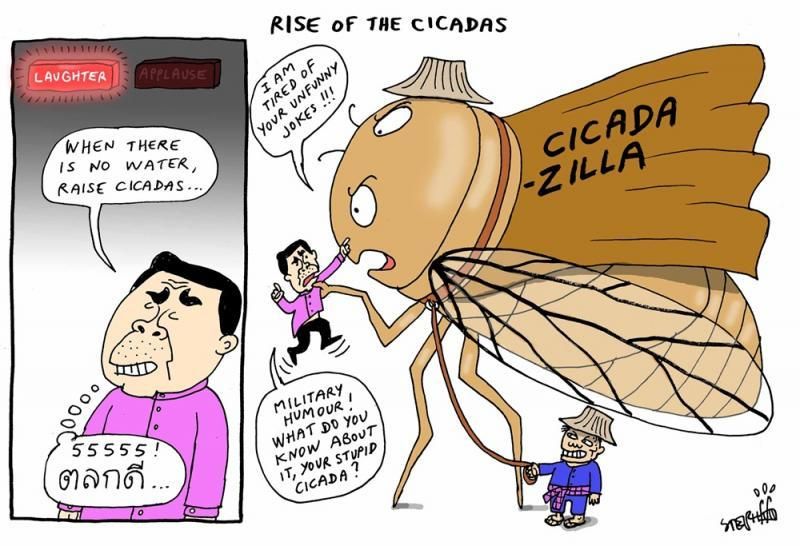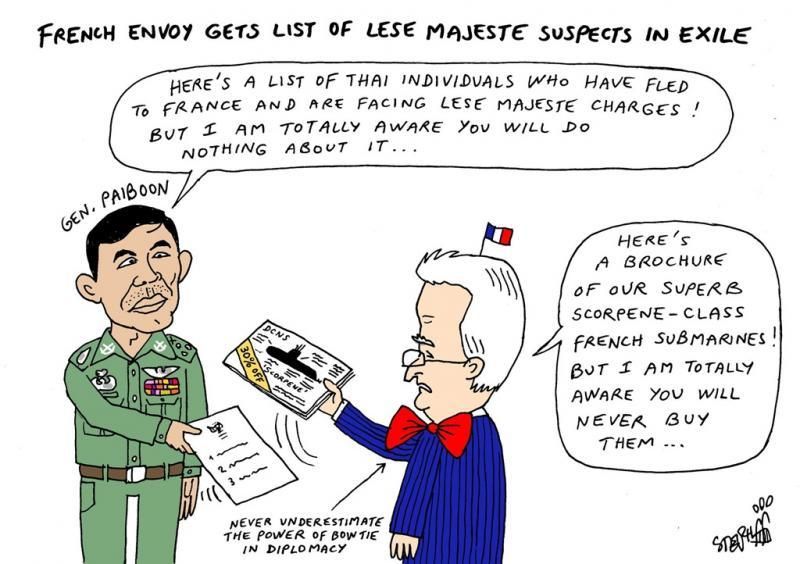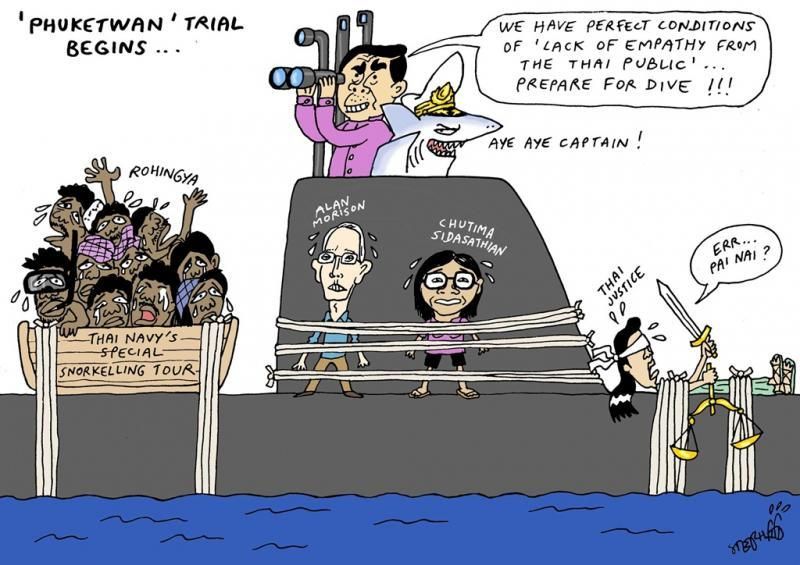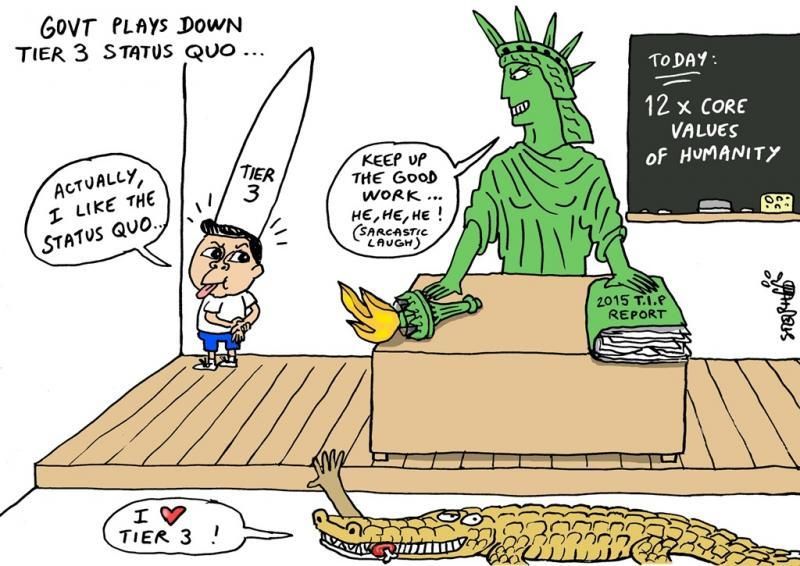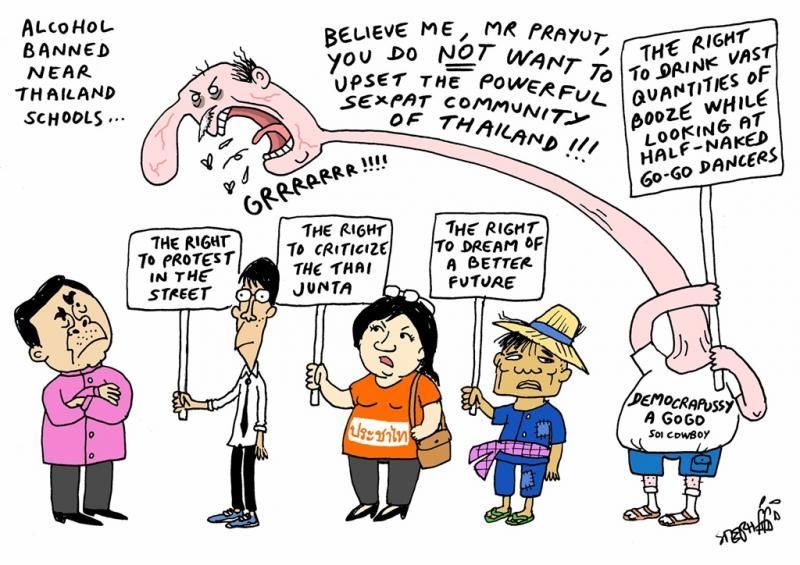-
IP addresses are NOT logged in this forum so there's no point asking. Please note that this forum is full of homophobes, racists, lunatics, schizophrenics & absolute nut jobs with a smattering of geniuses, Chinese chauvinists, Moderate Muslims and last but not least a couple of "know-it-alls" constantly sprouting their dubious wisdom. If you believe that content generated by unsavory characters might cause you offense PLEASE LEAVE NOW! Sammyboy Admin and Staff are not responsible for your hurt feelings should you choose to read any of the content here. The OTHER forum is HERE so please stop asking.
You are using an out of date browser. It may not display this or other websites correctly.
You should upgrade or use an alternative browser.
You should upgrade or use an alternative browser.
A Singaporean's guide to living in Thailand
- Thread starter Leongsam
- Start date
- Joined
- Jul 19, 2008
- Messages
- 30,580
- Points
- 0
Chicken hot pot




- Joined
- Jul 15, 2008
- Messages
- 21,146
- Points
- 113
(Smaller) slice of thai export mango. 3rd consecutive year drop in exports
EXPORT FORECAST
UTCC predicts 3.8% drop in Thai exports this year
Petchanet Pratruangkrai. The Nation July 15, 2015 1:00 am
THAI EXPORTS are forecast to shrink by 3.8 per cent this year - the worst performance in six years and a third consecutive year of contraction - due largely to the sluggish global economy, the low prices of oil and other commodities and the effects of drought on agricultural production, according to the University of the Thai Chamber of Commerce.
The UTCC predicts that the country's overseas shipments in the second half will grow by only 3.6 per cent, averaging US$18.51 billion (Bt630 billion) a month, which would mean full-year exports missing the Commerce Ministry's expansion target of 1.2 per cent.
"With only slight economic expansion and the impact of the global economic slowdown, as well as the problems in the fishery industry causing lower seafood exports, Thai shipments will face negative growth this year," Aat Pisanwanich, director of the UTCC's Centre for International Trade Studies, said yesterday.
He said that in order to drive export growth to 1.2 per cent, average monthly shipments in the second half would have to expand by 4.6 per cent to $20.15 billion. However, this would be difficult to achieve as several negative factors were still affecting exports to many of the Kingdom's markets.
Under its projection, the centre foresees Thai shipments in the worst case contracting by 7.5 per cent this year, and in the best case expanding by 0.4 per cent.
It has opted for a mid-range forecast of a 3.8-per-cent contraction to $218.89 billion, due to the relatively moderate level of shipments expected over the remaining months.
One positive factor currently helping to drive exports is the weakening value of the baht, which has depreciated by 3.02 per cent since early this year to 34 against the US dollar, although this will not help Thailand as much as expected since export rivals, mainly in Asean - and Indonesia and Malaysia, in particular - have even weaker currencies, said Aat.
Meanwhile, the US decision to restore tariff privileges to Thailand under its Generalised System of Preferences should help promote the growth of some Thai products to the US market, he added.
The centre chief said Thai shipments were, however, expected to return to positive growth next year following a recovery in the global economy.
That said, shipments would not grow as significantly as in the past due rising competitiveness in the global market place, he explained.
Thailand needs to maintain its market share in the world's trading, as it fell from 1.36 per cent in 2013 to 1.33 per cent last year, while Cambodia, Laos, Myanmar and Vietnam - the CLMV countries - improved their combined share from 0.97 per cent to 1.12 per cent, said the director.
To drive additional export growth, Aat suggested that Thai businesses should focus more on innovation and value-added products, as well as on high-technology production.
EXPORT FORECAST
UTCC predicts 3.8% drop in Thai exports this year
Petchanet Pratruangkrai. The Nation July 15, 2015 1:00 am
THAI EXPORTS are forecast to shrink by 3.8 per cent this year - the worst performance in six years and a third consecutive year of contraction - due largely to the sluggish global economy, the low prices of oil and other commodities and the effects of drought on agricultural production, according to the University of the Thai Chamber of Commerce.
The UTCC predicts that the country's overseas shipments in the second half will grow by only 3.6 per cent, averaging US$18.51 billion (Bt630 billion) a month, which would mean full-year exports missing the Commerce Ministry's expansion target of 1.2 per cent.
"With only slight economic expansion and the impact of the global economic slowdown, as well as the problems in the fishery industry causing lower seafood exports, Thai shipments will face negative growth this year," Aat Pisanwanich, director of the UTCC's Centre for International Trade Studies, said yesterday.
He said that in order to drive export growth to 1.2 per cent, average monthly shipments in the second half would have to expand by 4.6 per cent to $20.15 billion. However, this would be difficult to achieve as several negative factors were still affecting exports to many of the Kingdom's markets.
Under its projection, the centre foresees Thai shipments in the worst case contracting by 7.5 per cent this year, and in the best case expanding by 0.4 per cent.
It has opted for a mid-range forecast of a 3.8-per-cent contraction to $218.89 billion, due to the relatively moderate level of shipments expected over the remaining months.
One positive factor currently helping to drive exports is the weakening value of the baht, which has depreciated by 3.02 per cent since early this year to 34 against the US dollar, although this will not help Thailand as much as expected since export rivals, mainly in Asean - and Indonesia and Malaysia, in particular - have even weaker currencies, said Aat.
Meanwhile, the US decision to restore tariff privileges to Thailand under its Generalised System of Preferences should help promote the growth of some Thai products to the US market, he added.
The centre chief said Thai shipments were, however, expected to return to positive growth next year following a recovery in the global economy.
That said, shipments would not grow as significantly as in the past due rising competitiveness in the global market place, he explained.
Thailand needs to maintain its market share in the world's trading, as it fell from 1.36 per cent in 2013 to 1.33 per cent last year, while Cambodia, Laos, Myanmar and Vietnam - the CLMV countries - improved their combined share from 0.97 per cent to 1.12 per cent, said the director.
To drive additional export growth, Aat suggested that Thai businesses should focus more on innovation and value-added products, as well as on high-technology production.
- Joined
- Jul 15, 2008
- Messages
- 21,146
- Points
- 113
Money, money 
BAHT
Baht plunges 'quite fast' to six-year low against US dollar
http://www.nationmultimedia.com/bus...fast-to-six-year-low-against-US-30265111.html

The continued strength of the US dollar and the weak gold price have led to the baht depreciating to a six-year low, trading at Bt34.84 to the greenback yesterday.
Chantavarn Sucharitakul, the Bank of Thailand's assistant governor for Financial Markets Operations Group, admitted that the baht is dropping "quite fast", losing about 2 per cent against the dollar this week.
This is faster than the depreciation of other currencies in the region, which have depreciated 0.3-1.5 per cent.
"The external factor is driven by market speculation that the US Federal Reserve will hike its policy interest rate within this year based on the Fed's comments and recent positive US economic data while the price of gold has dropped below US$1,100 per ounce, which has led to increased demand for the precious metal and demand for the US dollar as well," she explained.
In addition, there are concerns that Thailand's economic performance could be hit by the ongoing drought and the delay in the government's investment projects.
Such an outlook has prompted analysts to lower the country's gross domestic product forecast for this year, with second-half growth to be less than the first half.
Chantavarn said the BOT has not seen any irregularity in the forex markets with relation to the baht.
"The weakening of the baht is needed to support the economic recovery but too rapid a deprecation would make it difficult for the private sector to adapt so the BOT is keeping a close watch," she said.
According to Kasikornbank, the baht is projected to drop below Bt35 to the dollar in the fourth quarter of this year, trading within the target of Bt35.25.
Vallop Vitanakorn, vice chairman of the Thai National Shippers Council, said the weakening baht has benefited the export sector, but importers will be negatively affected, especially those importing consumer and luxury goods.
Kasikornbank said in a report that Thai authorities had acknowledged that the use of the exchange rate during this time is more effective than cutting interest rates to buoy the flagging economy.
Vallop said imported raw materials, which will be re-exported, would not be affected significantly as it can be offset by foreign exchange income.
However, imports of machinery or capital goods may also be delayed to avoid a higher cost due to the baht's weakness, but long-term projects should not be affected.
Commerce Minister Chatchai Sarikulya said the baht's weakness should boost export growth in the second half of the year after facing a contraction in the first six months with June shipments estimated to be down 6-7 per cent year on year.
Exports in the first half of the year dropped about 5 per cent compared to the same period last year.
Charl Kengchon, managing director of Kasikorn Research Centre, said the US dollar has been supported by recent positive economic numbers, which had led to the deprecation of currencies in the Southeast Asia region, including the Thai baht.
"The market expects the US Federal Reserve to hike the US interest rate in September, which has led to the strengthening of the US dollar and the depreciation of the baht, which is a common factor for the region, while the drop in the price of gold has led people to buy gold. This has led to the baht depreciating even further since gold deals would require US dollars as the currency for transaction," he said.
"The capital outflow from Thailand's stock markets is also contributing to the weakening of the baht," he added.
While the baht dropped to a six-year low yesterday, gold prices are now at a five-year low, trading at $1091 on July 22.
The Stock Exchange of Thailand Index has dropped by 3.33 per cent from the beginning of the year, with capital outflow of Bt35.82 billion to date, including about Bt20 billion this month.
Tim Leelahaphan, Maybank Kim Eng Securities (Thailand) economist and assistant vice president of its Research Department said the firm still expects the baht to be around Bt34.50 per US dollar by the end of the third quarter.
"Short-term factors from foreign speculation and the strengthening of the US dollar might push the baht to go beyond Bt35 per dollar," he added.
Prinn Panitchpakdi, country head at CLSA Securities (Thailand), said the baht might go past Bt35 per US dollar as cash is flowing back to the US.
"CLSA expect the baht to be at Bt35-Bt35.5 by the end of the year but it can swing between Bt33.8-Bt35.5 in the next 5-6 months from the US rate hike and the expected improvement of Thailand's economy next year," he said.

BAHT
Baht plunges 'quite fast' to six-year low against US dollar
http://www.nationmultimedia.com/bus...fast-to-six-year-low-against-US-30265111.html

The continued strength of the US dollar and the weak gold price have led to the baht depreciating to a six-year low, trading at Bt34.84 to the greenback yesterday.
Chantavarn Sucharitakul, the Bank of Thailand's assistant governor for Financial Markets Operations Group, admitted that the baht is dropping "quite fast", losing about 2 per cent against the dollar this week.
This is faster than the depreciation of other currencies in the region, which have depreciated 0.3-1.5 per cent.
"The external factor is driven by market speculation that the US Federal Reserve will hike its policy interest rate within this year based on the Fed's comments and recent positive US economic data while the price of gold has dropped below US$1,100 per ounce, which has led to increased demand for the precious metal and demand for the US dollar as well," she explained.
In addition, there are concerns that Thailand's economic performance could be hit by the ongoing drought and the delay in the government's investment projects.
Such an outlook has prompted analysts to lower the country's gross domestic product forecast for this year, with second-half growth to be less than the first half.
Chantavarn said the BOT has not seen any irregularity in the forex markets with relation to the baht.
"The weakening of the baht is needed to support the economic recovery but too rapid a deprecation would make it difficult for the private sector to adapt so the BOT is keeping a close watch," she said.
According to Kasikornbank, the baht is projected to drop below Bt35 to the dollar in the fourth quarter of this year, trading within the target of Bt35.25.
Vallop Vitanakorn, vice chairman of the Thai National Shippers Council, said the weakening baht has benefited the export sector, but importers will be negatively affected, especially those importing consumer and luxury goods.
Kasikornbank said in a report that Thai authorities had acknowledged that the use of the exchange rate during this time is more effective than cutting interest rates to buoy the flagging economy.
Vallop said imported raw materials, which will be re-exported, would not be affected significantly as it can be offset by foreign exchange income.
However, imports of machinery or capital goods may also be delayed to avoid a higher cost due to the baht's weakness, but long-term projects should not be affected.
Commerce Minister Chatchai Sarikulya said the baht's weakness should boost export growth in the second half of the year after facing a contraction in the first six months with June shipments estimated to be down 6-7 per cent year on year.
Exports in the first half of the year dropped about 5 per cent compared to the same period last year.
Charl Kengchon, managing director of Kasikorn Research Centre, said the US dollar has been supported by recent positive economic numbers, which had led to the deprecation of currencies in the Southeast Asia region, including the Thai baht.
"The market expects the US Federal Reserve to hike the US interest rate in September, which has led to the strengthening of the US dollar and the depreciation of the baht, which is a common factor for the region, while the drop in the price of gold has led people to buy gold. This has led to the baht depreciating even further since gold deals would require US dollars as the currency for transaction," he said.
"The capital outflow from Thailand's stock markets is also contributing to the weakening of the baht," he added.
While the baht dropped to a six-year low yesterday, gold prices are now at a five-year low, trading at $1091 on July 22.
The Stock Exchange of Thailand Index has dropped by 3.33 per cent from the beginning of the year, with capital outflow of Bt35.82 billion to date, including about Bt20 billion this month.
Tim Leelahaphan, Maybank Kim Eng Securities (Thailand) economist and assistant vice president of its Research Department said the firm still expects the baht to be around Bt34.50 per US dollar by the end of the third quarter.
"Short-term factors from foreign speculation and the strengthening of the US dollar might push the baht to go beyond Bt35 per dollar," he added.
Prinn Panitchpakdi, country head at CLSA Securities (Thailand), said the baht might go past Bt35 per US dollar as cash is flowing back to the US.
"CLSA expect the baht to be at Bt35-Bt35.5 by the end of the year but it can swing between Bt33.8-Bt35.5 in the next 5-6 months from the US rate hike and the expected improvement of Thailand's economy next year," he said.
- Joined
- Jul 15, 2008
- Messages
- 21,146
- Points
- 113
More human trafficking of oldest profession.
DSI cracks down on gang trapping Thai women in KL sex trade
Piyanut Tumnukasetchai
The Nation July 25, 2015 1:00 am http://www.nationmultimedia.com/nat...gang-trapping-Thai-women-in-KL--30265178.html

THE Department of Special Investigation (DSI) is taking action against two Malaysians and their Thai wives for luring many Thai women into Malaysia's flesh trade.
The Thai Embassy in Kuala Lumpur has successfully rescued six Thai victims and alerted the DSI about this gang.
DSI has arrested Steven Low or Keng Siang Low, a Malaysian, and two Thai nationals, Ratchadaphan Saenkasem and Kallaya Somsri.
"We are going after the other Malaysian suspect," Pol Lt-Colonel Komwit Pattanarat of the DSI said at a press conference yesterday.
According to the DSI, the female suspects ran beauty salons in Bangkok's Bang Bon district and Phayao's Dok Khamtai district, through which they falsely advertised that they could place interested Thai women in well-paying jobs in Kuala Lumpur-based spas and karaoke parlours.
The suspects also used Facebook to lure their victims. After the victims agreed to take up job offers, they were sent to Malaysia and locked up at a place, and only allowed out to provide sexual services to customers.
"Catalogues found at the place show that this gang must have lured more than 100 victims already," Komwit said.
He warned Thai women to be careful about job offers that promise unusually high wages.
"Many Thai women end up being forced into prostitution after they take up such job offers," he said.
The three arrested suspects have been charges with several offences, including human trafficking.
DSI chief Suwana Suwanjuta said human trafficking was a serious crime and Thailand was now seriously combating this.
DSI cracks down on gang trapping Thai women in KL sex trade
Piyanut Tumnukasetchai
The Nation July 25, 2015 1:00 am http://www.nationmultimedia.com/nat...gang-trapping-Thai-women-in-KL--30265178.html

THE Department of Special Investigation (DSI) is taking action against two Malaysians and their Thai wives for luring many Thai women into Malaysia's flesh trade.
The Thai Embassy in Kuala Lumpur has successfully rescued six Thai victims and alerted the DSI about this gang.
DSI has arrested Steven Low or Keng Siang Low, a Malaysian, and two Thai nationals, Ratchadaphan Saenkasem and Kallaya Somsri.
"We are going after the other Malaysian suspect," Pol Lt-Colonel Komwit Pattanarat of the DSI said at a press conference yesterday.
According to the DSI, the female suspects ran beauty salons in Bangkok's Bang Bon district and Phayao's Dok Khamtai district, through which they falsely advertised that they could place interested Thai women in well-paying jobs in Kuala Lumpur-based spas and karaoke parlours.
The suspects also used Facebook to lure their victims. After the victims agreed to take up job offers, they were sent to Malaysia and locked up at a place, and only allowed out to provide sexual services to customers.
"Catalogues found at the place show that this gang must have lured more than 100 victims already," Komwit said.
He warned Thai women to be careful about job offers that promise unusually high wages.
"Many Thai women end up being forced into prostitution after they take up such job offers," he said.
The three arrested suspects have been charges with several offences, including human trafficking.
DSI chief Suwana Suwanjuta said human trafficking was a serious crime and Thailand was now seriously combating this.
- Joined
- Jul 15, 2008
- Messages
- 21,146
- Points
- 113
Not so upbeat rating of Thai banking sector
THE NATION July 25, 2015 1:00 am
Thai Banks face tough stretch in second half: Fitch
A PERSISTENT weak operational environment in Thailand suggests that loan impairments will |continue to rise, weighing on banks' profitability through the second half of 2015, says Fitch Ratings.
Loan-loss reserve coverage and capital for the largest banks remain strong, however, and the system is generally well positioned to cope with ongoing macroeconomic weakness without a major ratings impact. Downside macro risks remain, though, and a sharper-than-expected downturn or recession could lead to a more rapid deterioration in key bank financial indicators.
Fitch maintains a "negative" outlook on Thailand's banking sector. The financial data for the latest quarter highlight the ongoing operational challenges facing Thai banks.
Slow regional and global growth has put a drag on exports and manufacturing while key domestic sentiment indicators - such as consumer and industrial confidence - remain weak.
High household debt is also constraining consumer spending and loan growth.
Results for the seven largest Thai banks, which account for 81 per cent of market share in loans - Bangkok Bank, Siam Commercial Bank, Kasikornbank, Krungthai Bank, Bank of Ayudhya, TMB Bank and Thanachart - show higher loan-impairment charges and non-performing loans through the first half of the year.
The ratio of impaired loans to total gross loans for the seven banks had risen to 3 per cent by the end of first half from 2.8 per cent at the end of 2014, while "special mention" loans (for the four banks reporting them) rose to 2.9 per cent from 2.6 per cent over the same period.
McCann Thailand appoints new chief executive officer
Yupin Muntzing has been appointed chief executive officer of McCann Worldgroup Thailand, effective September 1.
Yupin has emerged from a dual role of being managing director at Muntzing Agency, an agency she founded in 2013, as well as CEO of Geometry Global, a WPP Company.
Before this, Yupin was managing director at OgilvyAction, a role she assumed in 2010 after a number of senior positions held at Ogilvy Group in both strategic planning and management since 2003.
Yupin replaces Monica White as CEO of McCann Worldgroup Thailand. White will remain with the agency while completing a thorough handover to ensure a smooth and full client/management transition with her successor.
White was appointed CEO of McCann Worldgroup Thailand in 2010, after originally joining |the network to set up and |lead McCann Direct Thailand in 1993.
THE NATION July 25, 2015 1:00 am
Thai Banks face tough stretch in second half: Fitch
A PERSISTENT weak operational environment in Thailand suggests that loan impairments will |continue to rise, weighing on banks' profitability through the second half of 2015, says Fitch Ratings.
Loan-loss reserve coverage and capital for the largest banks remain strong, however, and the system is generally well positioned to cope with ongoing macroeconomic weakness without a major ratings impact. Downside macro risks remain, though, and a sharper-than-expected downturn or recession could lead to a more rapid deterioration in key bank financial indicators.
Fitch maintains a "negative" outlook on Thailand's banking sector. The financial data for the latest quarter highlight the ongoing operational challenges facing Thai banks.
Slow regional and global growth has put a drag on exports and manufacturing while key domestic sentiment indicators - such as consumer and industrial confidence - remain weak.
High household debt is also constraining consumer spending and loan growth.
Results for the seven largest Thai banks, which account for 81 per cent of market share in loans - Bangkok Bank, Siam Commercial Bank, Kasikornbank, Krungthai Bank, Bank of Ayudhya, TMB Bank and Thanachart - show higher loan-impairment charges and non-performing loans through the first half of the year.
The ratio of impaired loans to total gross loans for the seven banks had risen to 3 per cent by the end of first half from 2.8 per cent at the end of 2014, while "special mention" loans (for the four banks reporting them) rose to 2.9 per cent from 2.6 per cent over the same period.
McCann Thailand appoints new chief executive officer
Yupin Muntzing has been appointed chief executive officer of McCann Worldgroup Thailand, effective September 1.
Yupin has emerged from a dual role of being managing director at Muntzing Agency, an agency she founded in 2013, as well as CEO of Geometry Global, a WPP Company.
Before this, Yupin was managing director at OgilvyAction, a role she assumed in 2010 after a number of senior positions held at Ogilvy Group in both strategic planning and management since 2003.
Yupin replaces Monica White as CEO of McCann Worldgroup Thailand. White will remain with the agency while completing a thorough handover to ensure a smooth and full client/management transition with her successor.
White was appointed CEO of McCann Worldgroup Thailand in 2010, after originally joining |the network to set up and |lead McCann Direct Thailand in 1993.
- Joined
- Jul 15, 2008
- Messages
- 21,146
- Points
- 113
Nothing of the sort, was there 2 weeks ago. Else, your question suggests crisis of major proportions. Drought's hurting some parts up country, especially rice farmers. For the capital, it's also "vested" interests...drought problem in Bangkok. Is it more difficult/expensive to buy bottled water and does water still flow from the taps?
Last edited:
- Joined
- Jul 15, 2008
- Messages
- 21,146
- Points
- 113
A slice of thai political mango today, a critical (editorial) piece of the junta 
EDITORIAL
Shuffling the pack won't improve Thailand's hand
The Nation July 28, 2015 1:00 am. http://www.nationmultimedia.com/opinion/Shuffling-the-pack-wont-improve-Thailands-hand-30265320.html
Decision to rejig the Cabinet comes after a year of deepening economic woes and 'frozen' social division
Prime Minister Prayut Chan-o-cha is set to make cosmetic changes to his Cabinet, but these will not solve any of the deep and growing political, economic and social problems now facing Thailand.
The obstacles are beyond the ability of Prayut and his crew to cope with.
The actions taken by the junta and the prime minister in the year since they seized power are merely repercussions of pre-existing problems, which they do nothing to solve.
The fundamental reality, which is being ignored by Prayut, the military and the elitist establishment, is that military coup was itself a part of the problem, not a solution as claimed.
First of all, it is widely acknowledged that the country is deeply divided along both political and social lines. It is not a simple question of a conflict between two camps of politicians, as Prayut has maintained all along. Compounding the crisis is the fact that the military was not a neutral party, as it claimed, but has sided with a particular faction from the beginning. Hence the junta and its supporters in the National Reform Council do not qualify to oversee the process of reconciliation.
Second, the coup-makers have swept away the foundations of democracy while simultaneously claiming to be enacting democratic reform. The absurdity of that contradiction seems lost on the junta. Prime Minister Prayut talks of democracy, yet at the same time he orders his soldiers to hunt for citizens who express "difference". Students and social activists, whose only weapons are thoughts and words, are regarded as a threat to national security by the junta.
Thailand has a long history of military coups, none of which has done anything to further the cause of democracy. To the contrary, each and every one has consolidated the power of an authoritarian elite.
Third, the junta has stuffed its administration with incapable individuals who have no mandate from the people whose interests they are supposed to be serving. Prayut, as junta leader, must take much of the blame for this state of affairs since he handpicked his own men for Cabinet positions. With changes now in the offing, we can only conclude that the wrong men were picked for the job. While it's true that certain members of the military might have some knowledge of economics, none of those in the Cabinet know how to run an economy in troubled times. Prayut's economic tsar has an impressive background in banking management, but his actions have failed to restrain or reverse the downturn. Thanks to an obsessive prejudice against "populist economic policy", his measures to stimulate growth have been too little, too late. The government's faith in an upswing powered by investment from the business sector has proved unfounded, yet it remains very reluctant to intervene to alleviate the plight of farmers. If a vast number of disadvantaged Thais are left to languish in poverty, the engine of growth that is domestic consumption suffers.
Fourth, the coup, junta rule and misjudged foreign policy have weakened Thailand's position when it comes to negotiating with other countries. Though no direct economic sanctions were levied against Thailand in response to the coup, our trade partners suspended negotiations for more market access to certain economic blocs. Meanwhile the junta's lax management of the aviation and fishery sectors has triggered penalties and ultimatums from foreign powers. In normal times, foreign policy is driven by economic interests, but the junta is instead focused on using its diplomats to justify the coup to the international community.
Finally, Premier Prayut has delivered a very confusing message with his Cabinet reshuffle. While he repeatedly blames politicians and elected governments for the deep-seated problems afflicting the country, the figures he is so desperate to bring into his Cabinet are politicians, including former ministers from previous elected administrations. After holding the electoral system and democracy responsible for placing the "wrong people" in charge, Prayut is now poised to prove that his way is no better, by placing the same people at the helm of his own administration.

EDITORIAL
Shuffling the pack won't improve Thailand's hand
The Nation July 28, 2015 1:00 am. http://www.nationmultimedia.com/opinion/Shuffling-the-pack-wont-improve-Thailands-hand-30265320.html
Decision to rejig the Cabinet comes after a year of deepening economic woes and 'frozen' social division
Prime Minister Prayut Chan-o-cha is set to make cosmetic changes to his Cabinet, but these will not solve any of the deep and growing political, economic and social problems now facing Thailand.
The obstacles are beyond the ability of Prayut and his crew to cope with.
The actions taken by the junta and the prime minister in the year since they seized power are merely repercussions of pre-existing problems, which they do nothing to solve.
The fundamental reality, which is being ignored by Prayut, the military and the elitist establishment, is that military coup was itself a part of the problem, not a solution as claimed.
First of all, it is widely acknowledged that the country is deeply divided along both political and social lines. It is not a simple question of a conflict between two camps of politicians, as Prayut has maintained all along. Compounding the crisis is the fact that the military was not a neutral party, as it claimed, but has sided with a particular faction from the beginning. Hence the junta and its supporters in the National Reform Council do not qualify to oversee the process of reconciliation.
Second, the coup-makers have swept away the foundations of democracy while simultaneously claiming to be enacting democratic reform. The absurdity of that contradiction seems lost on the junta. Prime Minister Prayut talks of democracy, yet at the same time he orders his soldiers to hunt for citizens who express "difference". Students and social activists, whose only weapons are thoughts and words, are regarded as a threat to national security by the junta.
Thailand has a long history of military coups, none of which has done anything to further the cause of democracy. To the contrary, each and every one has consolidated the power of an authoritarian elite.
Third, the junta has stuffed its administration with incapable individuals who have no mandate from the people whose interests they are supposed to be serving. Prayut, as junta leader, must take much of the blame for this state of affairs since he handpicked his own men for Cabinet positions. With changes now in the offing, we can only conclude that the wrong men were picked for the job. While it's true that certain members of the military might have some knowledge of economics, none of those in the Cabinet know how to run an economy in troubled times. Prayut's economic tsar has an impressive background in banking management, but his actions have failed to restrain or reverse the downturn. Thanks to an obsessive prejudice against "populist economic policy", his measures to stimulate growth have been too little, too late. The government's faith in an upswing powered by investment from the business sector has proved unfounded, yet it remains very reluctant to intervene to alleviate the plight of farmers. If a vast number of disadvantaged Thais are left to languish in poverty, the engine of growth that is domestic consumption suffers.
Fourth, the coup, junta rule and misjudged foreign policy have weakened Thailand's position when it comes to negotiating with other countries. Though no direct economic sanctions were levied against Thailand in response to the coup, our trade partners suspended negotiations for more market access to certain economic blocs. Meanwhile the junta's lax management of the aviation and fishery sectors has triggered penalties and ultimatums from foreign powers. In normal times, foreign policy is driven by economic interests, but the junta is instead focused on using its diplomats to justify the coup to the international community.
Finally, Premier Prayut has delivered a very confusing message with his Cabinet reshuffle. While he repeatedly blames politicians and elected governments for the deep-seated problems afflicting the country, the figures he is so desperate to bring into his Cabinet are politicians, including former ministers from previous elected administrations. After holding the electoral system and democracy responsible for placing the "wrong people" in charge, Prayut is now poised to prove that his way is no better, by placing the same people at the helm of his own administration.
- Joined
- Jul 19, 2008
- Messages
- 30,580
- Points
- 0
Oyster egg

Curry chicken


Curry chicken

- Joined
- Aug 8, 2008
- Messages
- 28,849
- Points
- 113
Oyster egg

Looks like roti prata
- Joined
- Jul 15, 2008
- Messages
- 21,146
- Points
- 113
No surprise to languishing thai mango's economy 
GDP
Economists stress need for investment to boost GDP
The Nation July 31, 2015 1:00 am
Investment is needed to boost gross domestic product (GDP) by more than 3 per cent in the coming years, economists have been stressing.
"How are we supposed to grow if our public and private sectors do not invest?" said Ekniti Nitithanprapas, deputy director-general of the Fiscal Policy Office.
It would be difficult to see the 4-per-cent-plus pace that Thais enjoyed 10-15 years ago, as combined public and private investment has dropped from more than 40 per cent of GDP before the 1997 crisis to the current 21-22 per cent, he said.
Private investment has fallen from more than 30 per cent pre-crisis to about 20 per cent now, while public investment plunged from more than 10 per cent to less than 5 per cent.
"If we had not built Suvarnabhumi Airport 10 years ago, we would be in even deeper trouble now since there is no way that the old Don Muang Airport would be able to accommodate the 28 million-29 million inbound tourists, which led to the 25-per-cent expansion in the tourism industry that we are enjoying right now," he told an economic seminar arranged by the National Legislative Assembly earlier this month.
Improvement of education is also imperative to enhance the effectiveness of the workforce while incentives are required to kick-start the migration of workers from the agricultural sector.
"About 67 per cent of our 39 million workers have only graduated from the Matthayom 3 (lower secondary) level and most of them are working in the wrong place, as one-third are in the agriculture sector, which only contributes to 7.9 per cent of GDP, while other sectors such as manufacturing and services cannot effectively expand because of the shortage of workers in their fields," he said.
Veerathai Santiprabhob, who becomes the next governor of the Bank of Thailand in October, said the government's effectiveness has to be improved, especially the investment performance of state-owned enterprises, in order to lower the public's cost of investment and increase the competitiveness of the private sector.
"The effectiveness of the government is imperative since they are the ones that are using most of the country's resources and they are the ones that control the regulations that dictate how other people can use the country's resources," he said.
The bureaucracy has grown by 50 per cent over the past 10 years while the 7-per-cent ratio of officials' wages and pensions to GDP means that the budget has tripled in the same period.
The ratio is the highest in Asia but the effectiveness of the government has dropped as manifested by the government's agencies' failures to comply with international standards.
The country's aviation oversight flunked the International Civil Aviation Organisation's test and the fishing industry relies on illegal, unreported and unregulated labour.
"In terms of real investment, Thailand is the only country in the region that is still unable to get back to the same level that we were capable of before the Asian financial crisis of 1997," he said.
"Only three manufacturing industries - telecommunication, renewable energy and logistics - have made any real investment since the crisis, while most of the foreign direct investments that have increased are going into the service sector, not manufacturing, meaning that the expansion of the production base is very limited" he added.
Nalin Chatchotitham, economist with HSBC Thailand, said separately that the 8-per-cent year-on-year contraction of manufacturing production in June, which was the fourth straight month of decline, surprised the market on the downside.
This reflected both softness in export orders and poor domestic demand for durable goods.
"While the recent weakness of the Thai baht is expected to ameliorate the weak performance of exports, the impact on new orders may become more visible only in the fourth quarter, as it takes time for businesses to consider prices and orders.
Although the baht depreciated rapidly in recent weeks, its year-to-date performance is not too far off from its regional peers.
Given the sluggish recovery of both external and domestic demand, the central bank is expected to lower its policy rate to 1.25 per cent, probably as soon as this quarter, to provide more support for the economy.
"Nevertheless, timely execution of public investment will be instrumental in ensuring the continuity of the economic recovery, especially as the severe drought is threatening to dampen private sentiment further," she added.

GDP
Economists stress need for investment to boost GDP
The Nation July 31, 2015 1:00 am
Investment is needed to boost gross domestic product (GDP) by more than 3 per cent in the coming years, economists have been stressing.
"How are we supposed to grow if our public and private sectors do not invest?" said Ekniti Nitithanprapas, deputy director-general of the Fiscal Policy Office.
It would be difficult to see the 4-per-cent-plus pace that Thais enjoyed 10-15 years ago, as combined public and private investment has dropped from more than 40 per cent of GDP before the 1997 crisis to the current 21-22 per cent, he said.
Private investment has fallen from more than 30 per cent pre-crisis to about 20 per cent now, while public investment plunged from more than 10 per cent to less than 5 per cent.
"If we had not built Suvarnabhumi Airport 10 years ago, we would be in even deeper trouble now since there is no way that the old Don Muang Airport would be able to accommodate the 28 million-29 million inbound tourists, which led to the 25-per-cent expansion in the tourism industry that we are enjoying right now," he told an economic seminar arranged by the National Legislative Assembly earlier this month.
Improvement of education is also imperative to enhance the effectiveness of the workforce while incentives are required to kick-start the migration of workers from the agricultural sector.
"About 67 per cent of our 39 million workers have only graduated from the Matthayom 3 (lower secondary) level and most of them are working in the wrong place, as one-third are in the agriculture sector, which only contributes to 7.9 per cent of GDP, while other sectors such as manufacturing and services cannot effectively expand because of the shortage of workers in their fields," he said.
Veerathai Santiprabhob, who becomes the next governor of the Bank of Thailand in October, said the government's effectiveness has to be improved, especially the investment performance of state-owned enterprises, in order to lower the public's cost of investment and increase the competitiveness of the private sector.
"The effectiveness of the government is imperative since they are the ones that are using most of the country's resources and they are the ones that control the regulations that dictate how other people can use the country's resources," he said.
The bureaucracy has grown by 50 per cent over the past 10 years while the 7-per-cent ratio of officials' wages and pensions to GDP means that the budget has tripled in the same period.
The ratio is the highest in Asia but the effectiveness of the government has dropped as manifested by the government's agencies' failures to comply with international standards.
The country's aviation oversight flunked the International Civil Aviation Organisation's test and the fishing industry relies on illegal, unreported and unregulated labour.
"In terms of real investment, Thailand is the only country in the region that is still unable to get back to the same level that we were capable of before the Asian financial crisis of 1997," he said.
"Only three manufacturing industries - telecommunication, renewable energy and logistics - have made any real investment since the crisis, while most of the foreign direct investments that have increased are going into the service sector, not manufacturing, meaning that the expansion of the production base is very limited" he added.
Nalin Chatchotitham, economist with HSBC Thailand, said separately that the 8-per-cent year-on-year contraction of manufacturing production in June, which was the fourth straight month of decline, surprised the market on the downside.
This reflected both softness in export orders and poor domestic demand for durable goods.
"While the recent weakness of the Thai baht is expected to ameliorate the weak performance of exports, the impact on new orders may become more visible only in the fourth quarter, as it takes time for businesses to consider prices and orders.
Although the baht depreciated rapidly in recent weeks, its year-to-date performance is not too far off from its regional peers.
Given the sluggish recovery of both external and domestic demand, the central bank is expected to lower its policy rate to 1.25 per cent, probably as soon as this quarter, to provide more support for the economy.
"Nevertheless, timely execution of public investment will be instrumental in ensuring the continuity of the economic recovery, especially as the severe drought is threatening to dampen private sentiment further," she added.
- Joined
- Jul 15, 2008
- Messages
- 21,146
- Points
- 113
D-Day today for registering Thai prepaid sim cards
Cut-off arrives Friday for prepaid mobile stragglers
• Bangkok Post Published: 31/07/2015 at 03:28 AM
• Newspaper section: Business
Nearly 20 million prepaid mobile phone numbers can expect to be cut off after Friday's deadline imposed by the national telecom regulator.
The National Broadcasting and Telecommunications Commission (NBTC) expects 65 million prepaid mobile users to register their personal information under the regulator's circular, effective Saturday.
The 20 million unregistered numbers are believed to be inactive users, said NBTC secretary-general Takorn Tantasith.
The regulation governing the registration of prepaid SIM cards is to prevent criminals that use unregistered SIM cards from easily exploiting the numbers for illicit activity. It also seeks to redress the rampant growth of prepaid subscribers, many of whom are virtual, causing a waste of phone number resources and misuse of prepaid SIM cards.
The cabinet approved the regulation earlier this year as part of the national security agenda. From Friday, those failing to register subscriber information will no longer be able to use outbound mobile calling and data services. They can receive incoming calls and SMS messages for one more month.
"We believe an additional 5 million prepaid users will register their numbers during August after they experience the cut-off," said Mr Takorn. He acknowledged that the NBTC could not bring all existing prepaid numbers into its registration system, as 20 million numbers are believed to be inactive.
Thailand has 105 million mobile subscribers, with 90 million being prepaid. The NBTC recently spent 40 million baht to promote its prepaid registration campaign, offering 50,000 service points to assist users.
From Feb 1 next year, mobile operators will be fined 80,000 baht a day if they activate new prepaid SIM cards without registering them
Cut-off arrives Friday for prepaid mobile stragglers
• Bangkok Post Published: 31/07/2015 at 03:28 AM
• Newspaper section: Business
Nearly 20 million prepaid mobile phone numbers can expect to be cut off after Friday's deadline imposed by the national telecom regulator.
The National Broadcasting and Telecommunications Commission (NBTC) expects 65 million prepaid mobile users to register their personal information under the regulator's circular, effective Saturday.
The 20 million unregistered numbers are believed to be inactive users, said NBTC secretary-general Takorn Tantasith.
The regulation governing the registration of prepaid SIM cards is to prevent criminals that use unregistered SIM cards from easily exploiting the numbers for illicit activity. It also seeks to redress the rampant growth of prepaid subscribers, many of whom are virtual, causing a waste of phone number resources and misuse of prepaid SIM cards.
The cabinet approved the regulation earlier this year as part of the national security agenda. From Friday, those failing to register subscriber information will no longer be able to use outbound mobile calling and data services. They can receive incoming calls and SMS messages for one more month.
"We believe an additional 5 million prepaid users will register their numbers during August after they experience the cut-off," said Mr Takorn. He acknowledged that the NBTC could not bring all existing prepaid numbers into its registration system, as 20 million numbers are believed to be inactive.
Thailand has 105 million mobile subscribers, with 90 million being prepaid. The NBTC recently spent 40 million baht to promote its prepaid registration campaign, offering 50,000 service points to assist users.
From Feb 1 next year, mobile operators will be fined 80,000 baht a day if they activate new prepaid SIM cards without registering them
- Joined
- Jul 19, 2008
- Messages
- 30,580
- Points
- 0
Looks like roti prata
Yeah the skill of the cook is quite good to make it look like that. Most of them cannot make it look like that.
- Joined
- Aug 8, 2008
- Messages
- 28,849
- Points
- 113
Had two Indian meals today, one lunch in Tanglin Halt http://www.sammyboy.com/showthread.php?110796-Queenstown-Today&p=2245612#post2245612
and another onboard

Nice
and another onboard

Nice
Similar threads
- Replies
- 0
- Views
- 198
- Replies
- 2
- Views
- 170
- Replies
- 2
- Views
- 214

